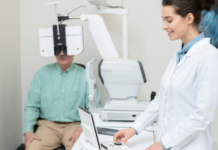New Delhi, July 21, 2014 – After acquiring his first KFC franchise in 1976, Zubair Kazi made a fortune in fast foods. Today, he owns 96 restaurants, predominantly KFCs in the U.S. and Virgin Islands, with 2,706 employees and total sales of $121 million in 2013. He also owns Burger King Hawaii, the largest BK franchise in the state. His restaurants, the international executive proudly affirms, will always remain his flagship businesses.
“Ways to save lives and help spare people needless pain—that’s what I’m especially looking for now,” Kazi says. After 8 years of careful product testing, he’s ready to announce his investment in an innovative medical imaging devices developed by Eigen, a California company.
A New, Non-Invasive Diagnostic Tool and Biopsy Aid for Prostate Cancer
Eigen’s Artemis and ProFuse devices are now in use as diagnostic tools for prostate cancer at more than 20 major research universities, including UCLA, Cornell, Emory, NYU and Stanford. “In particular, a multidisciplinary UCLA team headed by Leonard Marks, M.D., Urology, with members of the Radiology, Pathology and Biomedical Engineering departments, has been actively involved with the development and improvement of our system,” says Michael Ahmadi, M.D., Eigen Executive Vice President.
“I have known several men who suffered and died from prostate cancer, and so when I heard about Eigen’s new technology for detecting and precisely locating tumors without ‘blind biopsies,’ I thought I would invest,” Kazi remembers.
Today, Kazi is the sole owner of Eigen, and Founder and Director of the company’s Artemis Project, an imaging platform, “fusing” ultrasound and MRI, that detects prostate tumors, views images in 3D and allows for targeted, rather than conventional “blind” biopsies that take painful, exploratory samples.
In January 2014, the technology was featured on CNN with Dr. Sanjay Gupta, in an interview with Dr. Samir Taneja at NYU, who uses Eigen’s system.
“Our company and products are years ahead of the competition, and poised to enter manufacturing and sales partnerships with leading international medical brands,” says Dr. Mahtab Damda, Eigen President.
More than 1.5 million prostate biopsies are performed annually in the U.S. “Mr. Kazi is changing the standard of care for prostate biopsy through his forward-thinking vision,” Ahmadi says. “Eigen is a 40-year-old cutting-edge tech company, and its future is shaped around his vision,” he adds.
Also in Eigen’s pipeline are products adapting its fusion platform to the diagnosis and biopsy of ovarian, pancreatic and liver cancers.
Organic Agriculture and Aquaculture
In addition to Eigen’s medical technology, two of Kazi’s investments over the past decade are serving his goal of supporting human health—and, in these cases, the environment— through sustainable food production.
New Earth Life Sciences is an organic blue-green algae producer and processor in Oregon. “We harvest this wild, high-protein algae sustainably here in Klamath Lake, where it naturally and renewably grows,” says Bilal Ruknuddeen, New Earth CEO. “New Earth, under the guidance of Mr. Kazi, is continuing to improve its harvesting technology, with more details to be announced this summer.”
Operations, too, are green and sustainably minded at New Earth, in accordance with Kazi’s practice of being a good neighbor. “We hire local talent as much as possible, buy green power, and share our water supply with the community,” Ruknuddeen adds.
Paradise Shrimp Farm is a large, eco-friendly shrimp hatchery, farm and packager in Belize that is making promising advances in breeding Asian Tiger Shrimp, a naturally fast-growing species. “Belize is a very strict country with regard to protecting the environment, and we are proud to be 100 percent in compliance, from our water quality to growing shrimp free of antibiotics and added hormones and synthetic chemicals,” says Atheef Mohamed, General Manager.
Kazi points out that these newer investments remain in sync with the business model he evolved at KFC. First, he loves the challenge of turning around an underperforming enterprise and realizing its potential. Second, as a hands-on entrepreneur who has excelled at creative ways to make his restaurants and food extra-appealing to customers, Kazi loves innovation. “Each of these three businesses has an innovative product or approach,” he says. “I wanted to do something new.”
Whether it’s serving affordably priced food that meets his exacting quality standards, producing fast-growing, organic, high-protein algae and shrimp that can help feed the hungry, or fighting the war on cancer, Kazi’s forward-thinking investments “have a lot of potential to do worldwide good for people and the environment,” he says. “My motto is to do good by doing well.” BWI






















